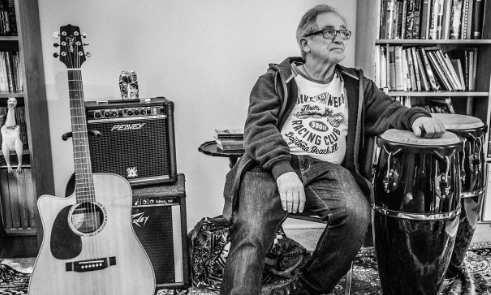TV will never look the same again—the genius behind The X-Files and Lost passed away at 78
By
Maan
- Replies 0
A visionary whose work reshaped television’s visual language has died at 78.
From the chilling darkness of The X-Files to the sunlit mysteries of Lost, his lens defined entire eras of storytelling.
Now, the film world is mourning the loss of John Bartley, a New Zealand-born cinematographer whose career spanned decades.
John S Bartley died on Sunday in Los Angeles, leaving behind a legacy that shaped both cinema and television.
His death was confirmed by close friend and Australian filmmaker Polly Pierce in a heartfelt social media post.
'It's with such a heavy heart to write that my long-time mentor and dear friend, the cinematographer John S Bartley ASC CSC, has passed on,' she wrote.
Polly credited Bartley’s groundbreaking work on The X-Files for inspiring her career, saying: 'If it wasn't for John and his landmark work on @thexfilestv I wouldn't be in film.'
Bartley’s signature style—dark, suspenseful, and visually arresting—defined the first three seasons of The X-Files, earning him widespread acclaim.
His work on Lost transported audiences into the lush, mysterious tropics, cementing his place as one of the medium’s great visual storytellers.
Born in Wellington in 1947, Bartley was the son of a career Army officer and a theatre cashier.
His father’s death when he was just 12 brought hardship, but afternoons spent in his mother’s ticket booth surrounded by musicals and live performances ignited his love for storytelling.
After high school, he apprenticed as an electrician before moving to Sydney at 20 to work as a lighting director in theatre and television.
He later moved to Canada, where he freelanced as a gaffer in Vancouver and learned from masters such as Sven Nykvist, Hiro Narita, Tak Fujimoto and Bob Stevens.
By the mid-1980s, Bartley had shifted into shooting commercials and music videos, eventually making his feature debut with Beyond the Stars, starring Martin Sheen.
His breakthrough came in 1993 when he joined The X-Files, collaborating with series creator Chris Carter to craft the show’s eerie, atmospheric look.
Bartley went on to work on Bates Motel, Roswell, Wu Assassins, Eight Legged Freaks, and films including #First Blood, #The Chronicles of Riddick and the 2014 #RoboCop remake.
He also served as second-unit cinematographer on The X-Files: I Want to Believe and other major productions.
Across his celebrated career, he earned three American Society of Cinematographers Award nominations and two Primetime Emmy nominations for The X-Files—winning the award in 1996.
Further Emmy nods followed for his work on Lost and Bates Motel.
In 1997, Bartley was named a member of the ASC, recognition of his outstanding contribution to cinematography.
Reflecting on his career, he once offered blunt but honest advice: 'The best advice I can give anyone is that there is nothing easy about working in this industry.
'You have to love it, because it is tough on family life when you are working 70 to 80 hours a week. Not everyone can do it.'
If you’re reflecting on the legacy of John Bartley, it’s inspiring to see how other cinematographers have also left a lasting mark on film and television.
One such figure is celebrated for a career that spanned decades, shaping the visual storytelling of countless productions.
Exploring their journey provides another real-life example of dedication, creativity, and influence behind the camera.
Read more: 'Much-loved, highly respected and long serving': Farewell to a film pioneer (75)

John Bartley leaves behind a timeless legacy of visual storytelling that will continue to inspire generations of filmmakers. May he rest in peace.
From the chilling darkness of The X-Files to the sunlit mysteries of Lost, his lens defined entire eras of storytelling.
Now, the film world is mourning the loss of John Bartley, a New Zealand-born cinematographer whose career spanned decades.
John S Bartley died on Sunday in Los Angeles, leaving behind a legacy that shaped both cinema and television.
His death was confirmed by close friend and Australian filmmaker Polly Pierce in a heartfelt social media post.
'It's with such a heavy heart to write that my long-time mentor and dear friend, the cinematographer John S Bartley ASC CSC, has passed on,' she wrote.
Polly credited Bartley’s groundbreaking work on The X-Files for inspiring her career, saying: 'If it wasn't for John and his landmark work on @thexfilestv I wouldn't be in film.'
Bartley’s signature style—dark, suspenseful, and visually arresting—defined the first three seasons of The X-Files, earning him widespread acclaim.
His work on Lost transported audiences into the lush, mysterious tropics, cementing his place as one of the medium’s great visual storytellers.
Born in Wellington in 1947, Bartley was the son of a career Army officer and a theatre cashier.
His father’s death when he was just 12 brought hardship, but afternoons spent in his mother’s ticket booth surrounded by musicals and live performances ignited his love for storytelling.
After high school, he apprenticed as an electrician before moving to Sydney at 20 to work as a lighting director in theatre and television.
He later moved to Canada, where he freelanced as a gaffer in Vancouver and learned from masters such as Sven Nykvist, Hiro Narita, Tak Fujimoto and Bob Stevens.
By the mid-1980s, Bartley had shifted into shooting commercials and music videos, eventually making his feature debut with Beyond the Stars, starring Martin Sheen.
His breakthrough came in 1993 when he joined The X-Files, collaborating with series creator Chris Carter to craft the show’s eerie, atmospheric look.
Bartley went on to work on Bates Motel, Roswell, Wu Assassins, Eight Legged Freaks, and films including #First Blood, #The Chronicles of Riddick and the 2014 #RoboCop remake.
He also served as second-unit cinematographer on The X-Files: I Want to Believe and other major productions.
Across his celebrated career, he earned three American Society of Cinematographers Award nominations and two Primetime Emmy nominations for The X-Files—winning the award in 1996.
Further Emmy nods followed for his work on Lost and Bates Motel.
In 1997, Bartley was named a member of the ASC, recognition of his outstanding contribution to cinematography.
Reflecting on his career, he once offered blunt but honest advice: 'The best advice I can give anyone is that there is nothing easy about working in this industry.
'You have to love it, because it is tough on family life when you are working 70 to 80 hours a week. Not everyone can do it.'
If you’re reflecting on the legacy of John Bartley, it’s inspiring to see how other cinematographers have also left a lasting mark on film and television.
One such figure is celebrated for a career that spanned decades, shaping the visual storytelling of countless productions.
Exploring their journey provides another real-life example of dedication, creativity, and influence behind the camera.
Read more: 'Much-loved, highly respected and long serving': Farewell to a film pioneer (75)
Key Takeaways
- John Bartley’s work defined the visual style of The X-Files and Lost.
- He won a Primetime Emmy in 1996 for cinematography on The X-Files.
- His career began in theatre and television lighting before moving into film.
- He was mentored by some of cinema’s greatest cinematographers and became a mentor himself.
John Bartley leaves behind a timeless legacy of visual storytelling that will continue to inspire generations of filmmakers. May he rest in peace.








